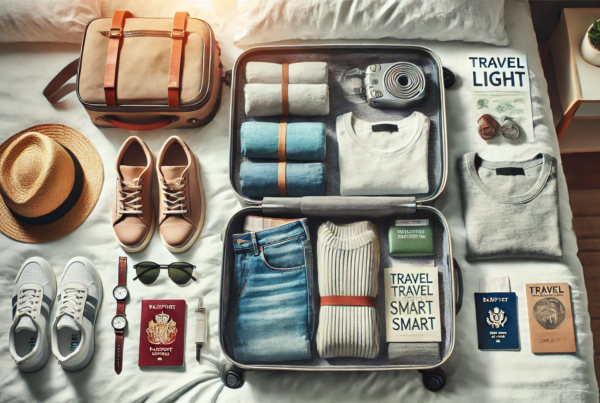For many people, traveling is more than just a pastime. It’s a need, a calling and, for some, an obsession. The constant pull to explore new places, meet new people and discover unfamiliar cultures is so powerful that it can sometimes feel like a kind of addiction. But what’s behind this relentless desire to wander the globe? Is it purely about curiosity and adventure or are there deeper psychological and biological forces at play? In this article, we’ll dive into the psychology behind travel addiction and explore the emotional, cognitive and biological factors that contribute to wanderlust.
1. The Urge to Explore: A Deep-Seated Desire
At its core, the urge to travel is deeply rooted in human nature. Humans have an innate curiosity to explore the world beyond their immediate surroundings. Evolutionarily, our ancestors’ ability to explore and adapt to new environments was key to survival. As our species evolved, the need to seek out new territory and discover resources became ingrained in our psyche.
Today, this ancient drive still lingers in us, though the challenges of survival are no longer a concern. Instead, the desire to explore has shifted toward experiencing the unknown, satisfying our curiosity and enriching our lives with diverse perspectives. The urge to travel and explore can be seen as an extension of this basic, primal instinct. It’s our brain’s way of continuing an evolutionary trait that once ensured our survival, but now serves to enrich our lives emotionally and intellectually.
2. Dopamine and Discovery: The Pleasure of New Experiences
One of the key psychological mechanisms driving travel addiction is the brain’s chemistry, particularly the role of dopamine, often called the “feel-good” neurotransmitter. Dopamine is released when we experience something novel or rewarding and it plays a pivotal role in reinforcing behaviours that are pleasurable or beneficial.
When we travel to new places, we expose ourselves to a variety of stimuli that trigger the release of dopamine. The excitement of discovering a new culture, tasting new foods or seeing a breathtaking view stimulates the brain’s reward system, giving us that “rush” of pleasure.
This release of dopamine doesn’t just happen when we reach our destination. It also occurs when we’re planning the trip, anticipating the adventure and imagining the new experiences we’ll have. In fact, studies have shown that the anticipation of a trip can sometimes be just as rewarding as the trip itself, due to the dopamine boost that accompanies our expectations. Believe us, this could not be more true. The MustGo team feeds off this dopamine.
As we continue to seek out these pleasurable experiences, our brain begins to associate travel with joy and reward, making us crave it more. This reinforces the cycle of travel addiction, where each new trip strengthens our desire for the next one.
3. Escaping Routine: A Mental Reboot
For many, the appeal of travel lies not just in exploring new places but in escaping the monotony of everyday life. Modern life often comes with a predictable, sometimes draining routine: work, obligations, responsibilities and the stress that can accumulate from the daily grind. Travel offers a temporary respite from these pressures, providing an opportunity to reset and rejuvenate both physically and mentally.
Traveling allows us to break free from the constraints of daily routines and step into a world of spontaneity, novelty and freedom. The unpredictability of new environments, combined with the excitement of unfamiliar experiences, creates a sense of liberation that’s hard to replicate in our daily lives. It’s during these escapes that we can discover new passions, tap into hidden strengths and feel like we’re living in a world of endless possibilities.
Additionally, the act of “escaping” allows for a form of personal growth that might be harder to achieve in familiar surroundings. By removing ourselves from our daily context, we are often forced to adapt to new circumstances, build resilience and develop problem-solving skills. These experiences foster a sense of personal transformation, making us feel more fulfilled and more capable.
4. The Role of Novelty: Thriving on New Experiences
Humans are wired to seek out novelty. Psychologically, we’re driven to experience new things because novelty activates areas of our brain that are associated with motivation and reward. This explains why we feel so excited about the idea of visiting a new city, country or continent. New experiences not only provide a rush of dopamine but they also challenge our perspectives, expand our horizons and help us grow as individuals.
In travel, novelty doesn’t just mean visiting new places. It’s also about trying new things. From learning a foreign language to tasting exotic dishes, every new experience is an opportunity to push our boundaries. Travel gives us a permission slip to break from our comfort zones and immerse ourselves in unfamiliar activities.
For many, this craving for novelty is what fuels their desire to keep traveling. The world becomes a canvas of endless opportunities for newness and excitement. Over time, however, the brain becomes addicted to this novelty – leading people to constantly seek out the next adventure, whether it’s a weekend getaway or a year-long world tour.
5. Social Media and the Fear of Missing Out (FOMO)
In today’s digital age, social media plays a significant role in perpetuating the desire to travel. Platforms like Instagram, Facebook and TikTok (at least to date) are flooded with images of picturesque landscapes, exotic destinations and “bucket list” experiences. The constant stream of travel content can trigger what is known as FOMO — the Fear of Missing Out.
As we scroll through these images and videos, we’re not only captivated by the beauty of far-flung places, but we also feel a pressure to experience them ourselves. The more we see others exploring the world, the more we feel compelled to follow suit. In some cases, this can lead to a sense of urgency – a feeling that if we don’t travel now, we might miss out on an experience that could enrich our lives.
6. The Psychological Benefits: Fulfilment, Well-Being and Connection
While travel addiction can sometimes be seen in a negative light, there are numerous psychological benefits that come with a constant urge to explore. For many travellers, the pursuit of adventure offers a deep sense of fulfilment and personal satisfaction. Each journey is an opportunity to discover more about the world and about themselves.
At a deeper level, travel can help build self-confidence. Navigating new places, adapting to unfamiliar environments and overcoming obstacles all contribute to a sense of personal growth and resilience. This fosters a positive feedback loop where travel is not just a way to escape but also a tool for personal development and self-discovery.
MustGo’s Tip
While the urge to travel can sometimes feel overwhelming, it’s important to remember that the benefits are profound. Travel can bring about increased happiness, fulfilment and a broader worldview. The key is finding balance: recognising that wanderlust is not just about “getting away,” but about deepening your connection to yourself, others and the world.
So, the next time you feel that urge to book a flight and explore somewhere new, know that it’s not just about satisfying a fleeting desire, it’s about responding to a primal call that’s deeply embedded in the human psyche. Embrace it, and let your journeys be a catalyst for greater self-discovery and joy.
Too busy to plan such trips yourself? Chill, we’ve got you covered. Check out our trip offerings or alternatively, hit us up via email on info@mustgo.mt or via WhatsApp on +356 77643434 for a quick chat. We’re available 24/7. Don’t think. Travel.




